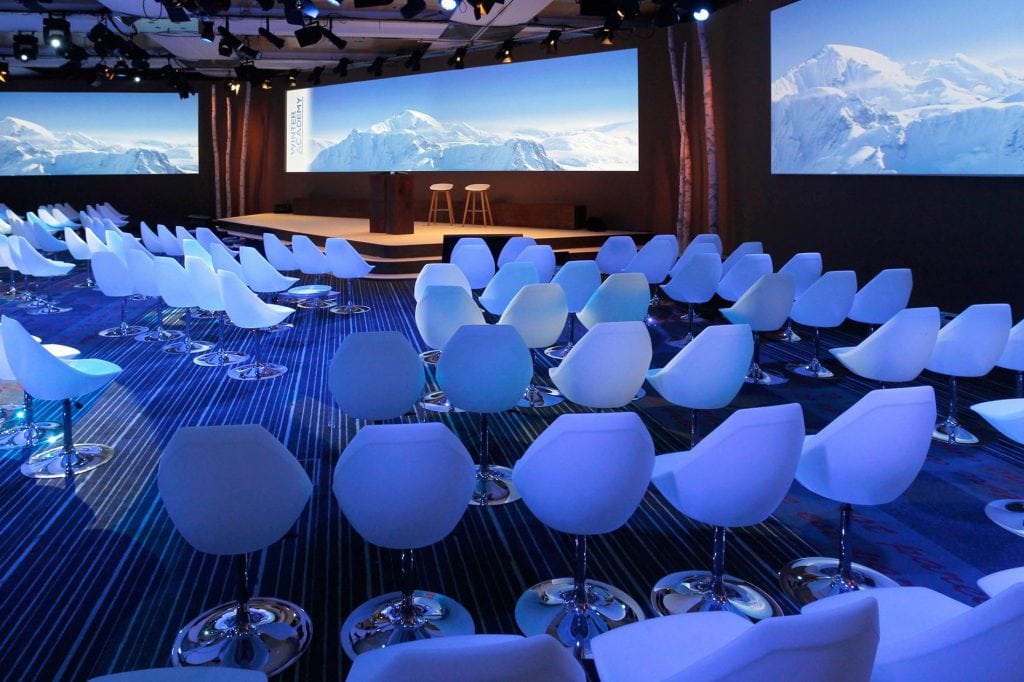Skift Take
Events played a critical role in both building community and generating revenue. But the forced pause in events, like the forced pause of the office, will lead to lasting changes, even if those who depend on events as a high-margin revenue source want them to snap back to how they were.

For our Viewpoint series, Skift invites thought leaders, some from the less obvious corners of travel, to join in the conversation. We know that these independent voices are important to the dialogue within the industry. Our guest columnists will identify and shape what global trends and through lines will define the future of travel.
Every day, I check the CDC site to track how many shots have gone into arms. The quickening pace of vaccinations, along with the approval of a third vaccine that only requires one shot and can be stored more easily, is a sign that the beginning of the end has finally arrived. For those with events business, this couldn’t come quick enough.
Over the years, I’ve been to hundreds of events. Digiday started its life as an events company, and events played a critical role in both building community and generating revenue. But the forced pause in events, like the forced pause of the office, will lead to lasting changes, even if those who depend on events as a high-margin revenue source want them to snap back to how they were.
For the Latest on Events, Go to EventMB, a Skift Brand.
I believe events will join in the unbundling phase the media business is currently experiencing. Business-to-business events have always been a bundle that provided different forms of value to different constituencies. Like all bundles, this made parts of events not only irrelevant to some participants but a complete waste, similar to how someone who wryly says “sportball” doesn’t want to pay for ESPN every month.
The typical events bundle serves a few purposes:
Thought leadership. This is the stuff that happens on the main stage. Events vary, but this is often the least valuable part of events but needed for the convening power.
Peer-to-peer networking. “It’s still a relationship business” is a quote that I read every couple weeks in copy. And it’s true. People want to meet others for business relationships, jobs and ideas on common problems.
Sales leads. Industry events are always crawling with sales people because qualified leads are the oxygen of sales. Events, even at far flung locales, can be efficient marketplaces in matching buyers and sellers. This is the most critical function of most industry event — it’s what generates most of the money — what our former CRO, Drew Schutte, called “a dealmaking atmosphere.” (I think he meant cocktail parties.)
Boondoggle. Over the last decade, I’ve been to more resorts than I can count. We had events in great places, from Vail to Miami to Milan to Nice to Half Moon Bay. There’s a reason the Cannes Lions are not the Cleveland Lions. (No offense, Cleveland. I quite like the Flats neighborhood.) It’s easy to eye-roll at this aspect, but it serves a role for many companies in the media industry, both giving people a bit of a breather and, critically, as a form of non-monetary compensation. Being sent to a Digiday event in New Orleans as an ad ops person is a nice perk.
The problem of this bundle is the same for every bundle. Many of the features don’t apply to different audience segments. Sales people have no interest in the programming — most would be out by the croissants buttonholing people — and top executives had no interest in being pitched by vendors. The CFOs hate the boondoggling. And so on. Early on in the pandemic, at a company meeting, I urged our sales team to skip mourning the loss of in-person events and find ways instead to solve for the needs of clients because those didn’t go away. Events are a means to an ends — most are about fostering relationships between attendees — and inevitably, the adaptions of the past year will change events, as they’re reformulated to serve different purposes. Just as you don’t need a full cable subscription to watch live sports programming, new models will emerge that reconfigure the benefits of in-person events.
The rise of Clubhouse and others like it — I’d suggest checking out Upstream, a more B2B alternative — show that the overly air conditioned ballroom with terrible carpeting is a complete anachronism. Any evening I can fire up Clubhouse and hear from the type of people who would headline conferences. It’s free (for now) and no need to connect through Charlotte or land at JFK at midnight.
Companies now have a year without in-person events and can get a gauge on how much it has impacted their sales efforts. My guess is they’ll find that the impact was real but not extreme. Business travel will bounce back far more slowly than personal travel as restrictions are eased. Just as many companies aren’t eager to jump into big, splashy headquarters offices, many too aren’t eager to ramp back T&E to pre-pandemic levels.
Here’s how I see events changing as we emerge from the pandemic:
Flexible. Just like the office debate ± and most debates these days — is miscast as an all-or-nothing proposition, the future of events are a mix of in-person and virtual. Some events will be all of one or the other, but organizers will have a portfolio with some mixed, some all in-person and all-virtual.
Smaller and more curated. One of the struggles with the sponsor-driven events model is you really only vet half the room. People will go to few events, and they’ll want more value. That means event organizers will need to follow the lead of publishing and become more focused and thoughtful vs a free-for-all approach that leaves many attendees wondering why they’re there.
More participatory. Speaking of attendees, we used to say we wanted “participants” vs attendees. That was a bit aspirational, and very difficult when you have groups with vastly different goals. But I believe the best events will nail this since across all forms of media participation is winning out over passive consumption.
Less frequent. I have to think even the most hardened road warriors are feeling the benefits of not traveling so much. Business travel is an incredibly inefficient use of time, bad for the environment and expensive for companies. An event should be, well, an event, not a widget coming off the assembly line.
More experiential. There is space for events that dispense with programming altogether and instead focus on networking. The reality is people aren’t going to pack into ballrooms anytime soon. That will create an opening for events that are mostly or entirely outside. You’ll see golf outings, cycling trips, hikes and more.
Less boozy. I have a running list of events hijinx in my Notes. They run the gamut from a sales guy who streaked the lobby to a hotel fishing Brits out of a Barcelona pool at 4am to sending hotel security to wake a missing speaker in Miami. Good times, but now over. The focus on health will combine with crackdowns on all types of bad behavior in professional settings to make industry events less of a party.
That all makes this a pivotal time for the events business, with openings to rethink how the upsides of events — insights, connections, sales, some fun — are rethought and new models emerge. There will be those that continue with their pre-pandemic models, but I believe that will be a mistake. The world has changed.
Brian Morrissey is the founder of The Rebooting, a weekly newsletter on sustainable media.This post first appeared in that newsletter. Morrissey is the former president and editor-in-chief of Digiday.
Have a confidential tip for Skift? Get in touch
Tags: coronavirus, events, meetings, viewpoint
Photo credit: An empty event space at an Accor Hotel. Skift

